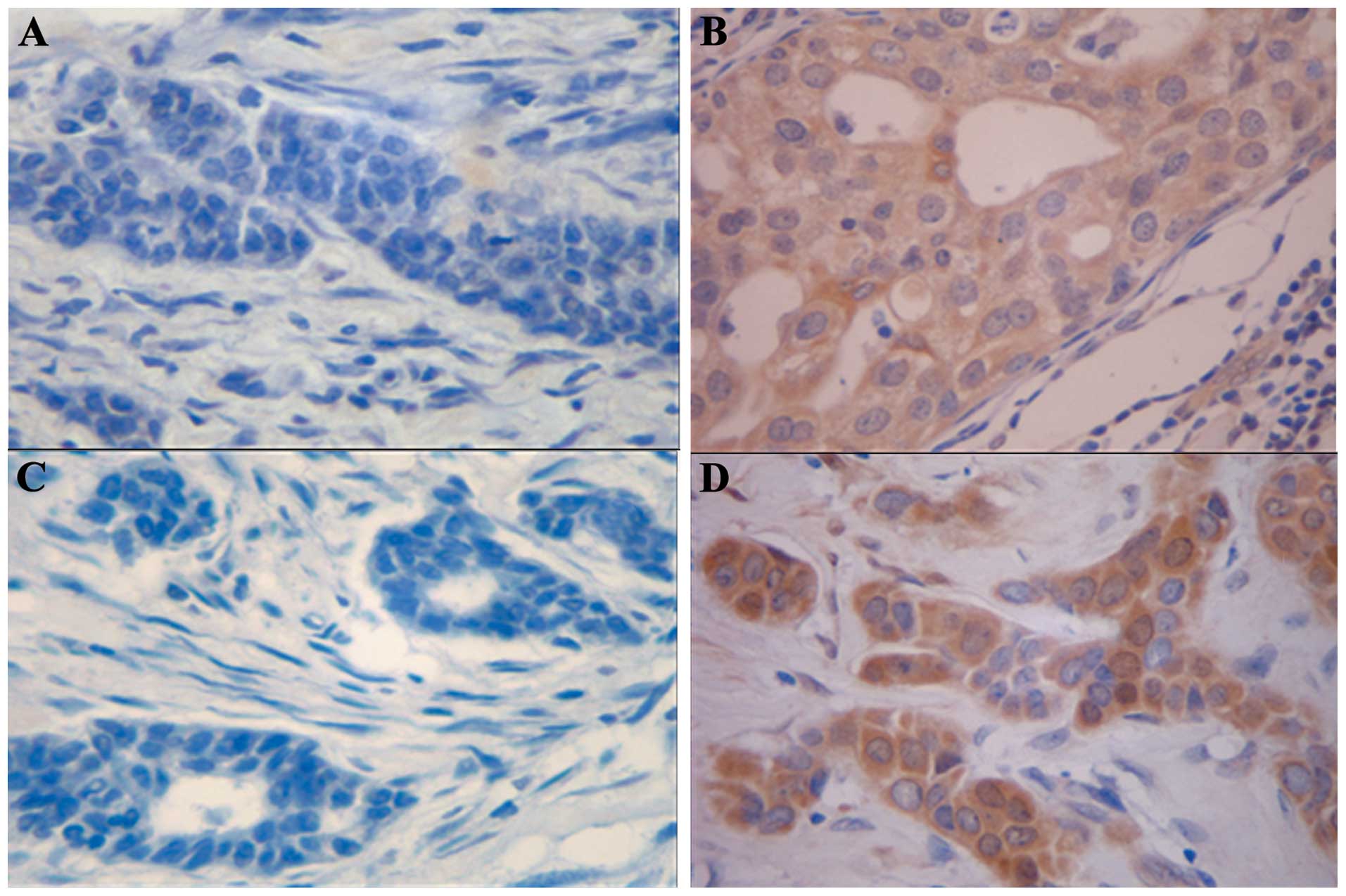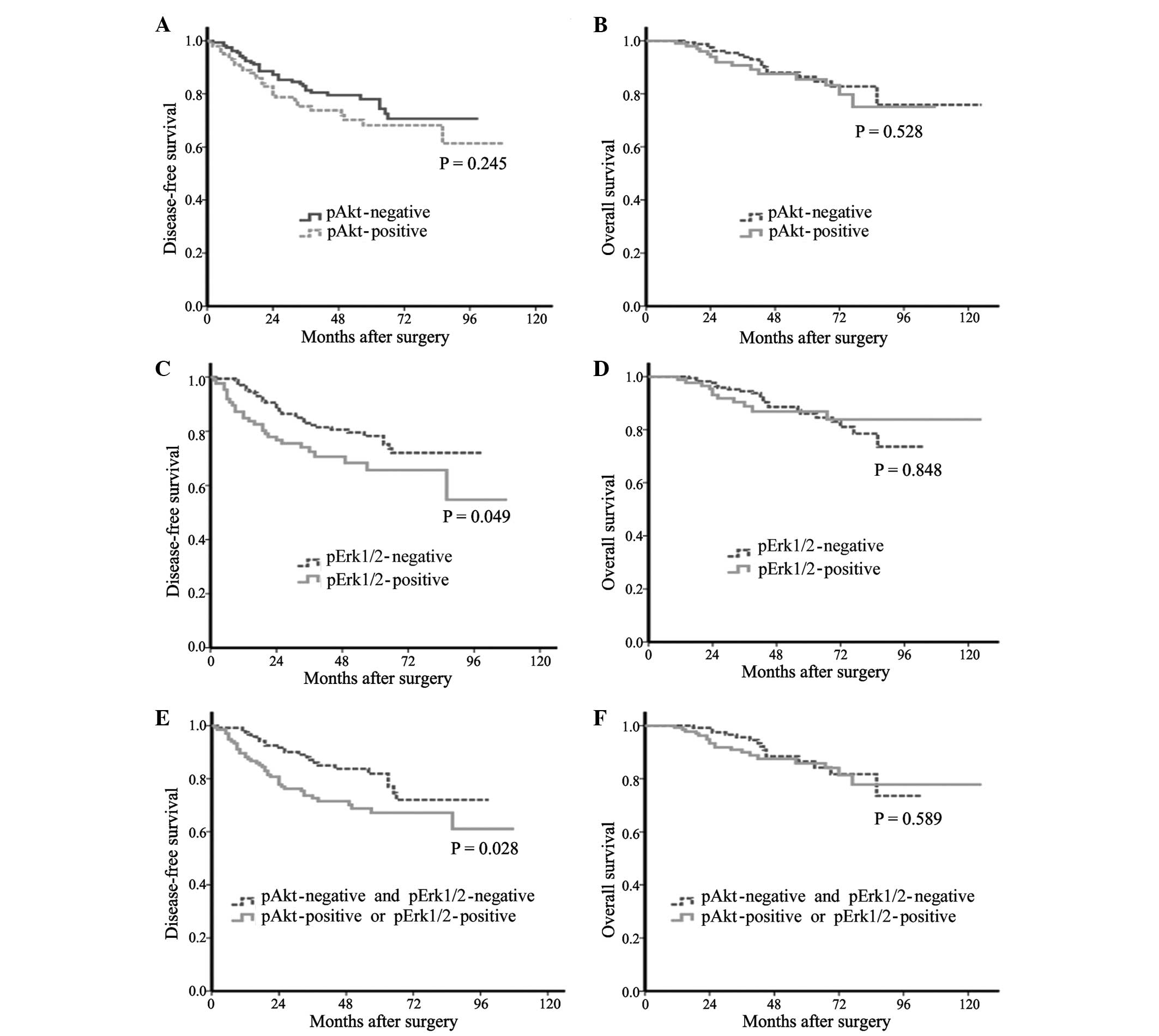|
1
|
Fan L, Strasser-Weippl K, Li JJ, et al:
Breast cancer in China. Lancet Oncol. 15:e279–e289. 2014.
View Article : Google Scholar : PubMed/NCBI
|
|
2
|
Goldhirsch A, Wood WC, Gelber RD, Coates
AS, Thürlimann B and Senn HJ: Meeting highlights: updated
international expert consensus on the primary therapy of early
breast cancer. J Clin Oncol. 21:3357–3365. 2003. View Article : Google Scholar : PubMed/NCBI
|
|
3
|
Nicholson KM and Anderson NG: The protein
kinase B/Akt signalling pathway in human malignancy. Cell Signal.
14:381–395. 2002. View Article : Google Scholar : PubMed/NCBI
|
|
4
|
Cheng GZ, Chan J, Wang Q, Zhang W, Sun CD
and Wang LH: Twist transcriptionally up-regulates AKT2 in breast
cancer cells leading to increased migration, invasion, and
resistance to paclitaxel. Cancer Res. 67:1979–1987. 2007.
View Article : Google Scholar : PubMed/NCBI
|
|
5
|
Amiri A, Noei F, Jeganathan S, Kulkarni G,
Pinke DE and Lee JM: eEF1A2 activates AKT and stimulates
AKT-dependent actin remodeling, invasion and migration. Oncogene.
26:3027–3040. 2007. View Article : Google Scholar
|
|
6
|
Srinivasan S, Koduru S, Kumar R, et al:
Diosgenin targets AKT-mediated prosurvival signaling in human
breast cancer cells. Int J Cancer. 125:961–967. 2009. View Article : Google Scholar : PubMed/NCBI
|
|
7
|
Andre F, Nahta R, Conforti R, et al:
Expression patterns and predictive value of phosphorylated AKT in
early-stage breast cancer. Ann Oncol. 19:315–320. 2008. View Article : Google Scholar
|
|
8
|
Tokunaga E, Kimura Y, Oki E, et al: Akt is
frequently activated in HER2/neu-positive breast cancers and
associated with poor prognosis among hormone-treated patients. Int
J Cancer. 118:284–289. 2006. View Article : Google Scholar
|
|
9
|
Schmitz KJ, Otterbach F, Callies R, et al:
Prognostic relevance of activated AKT kinase in node-negative
breast cancer: a clinicopathological study of 99 cases. Mod Pathol.
17:15–21. 2004. View Article : Google Scholar
|
|
10
|
Liang K, Lu Y, Li X, Zeng X, Glazer RI,
Mills GB and Fan Z: Differential roles of
phosphoinositide-dependent protein kinase-1 and akt1 expression and
phosphorylation in breast cancer cell resistance to paclitaxel,
doxorubicin and gemcitabine. Mol Pharmacol. 70:1045–1052. 2006.
View Article : Google Scholar : PubMed/NCBI
|
|
11
|
Knuefermann C, Lu Y, Liu B, et al:
HER2/PI-3k/AKT activation leads to a multidrug resistance in human
breast adenocarcinoma cells. Oncogene. 22:3205–3212. 2003.
View Article : Google Scholar : PubMed/NCBI
|
|
12
|
Li X, Lu Y, Liang K, Liu B and Fan Z:
Differential responses to doxorubicin-induced phosphorylation and
activation of AKT in human breast cancer cells. Breast Cancer Res.
7:R589–R597. 2005. View
Article : Google Scholar : PubMed/NCBI
|
|
13
|
Roudier E, Mistafa O and Stenius U:
Statins induce mammalian target of rapamycin (mTOR)-mediated
inhibition of Akt signaling and sensitize p53-deficient cells to
cytostatic drugs. Mol Cancer Ther. 5:2706–2715. 2006. View Article : Google Scholar : PubMed/NCBI
|
|
14
|
Mondesire WH, Jian W, Zhang H, Ensor J,
Hung MC, Mills GB and Meric-Bernstam F: Targeting mammalian target
of rapamycin synergistically enhances chemotherapy-induced
cytotoxicity in breast cancer cells. Clin Cancer Res. 10:7031–7042.
2004. View Article : Google Scholar : PubMed/NCBI
|
|
15
|
Santen RJ, Song RX, McPherson R, Kumar R,
Adam L, Jeng MH and Yue W: The role of mitogen-activated protein
(MAP) kinase in breast cancer. J Steroid Biochem Mol Biol.
80:239–256. 2002. View Article : Google Scholar : PubMed/NCBI
|
|
16
|
McCubrey JA, Steelman LS, Abrams SL, et
al: Roles of the RAF/MEK/ERK and PI3K/PTEN/AKT pathways in
malignant transformation and drug resistance. Adv Enzyme Regul.
46:249–279. 2006. View Article : Google Scholar : PubMed/NCBI
|
|
17
|
Milde-Langosch K, Bamberger AM, Rieck G,
Grund D, Hemminger G, Müller V and Löning T: Expression and
prognostic relevance of activated extracellular regulated kinases
(ERK1/2) in breast cancer. Br J Cancer. 92:2206–2215. 2005.
View Article : Google Scholar : PubMed/NCBI
|
|
18
|
Mueller H, Flury N, Eppenberger-Castori S,
Kueng W, David F and Eppenberger U: Potential prognostic value of
mitogen-activated protein kinase activity for disease-free survival
of primary breast cancer patients. Int J Cancer. 89:384–388. 2000.
View Article : Google Scholar : PubMed/NCBI
|
|
19
|
Gee JM, Robertson JF, Ellis IO and
Nicholson RI: Phosphorylation of ERK1/2 mitogen-activated protein
kinase is associated with poor response to anti-hormonal therapy
and decreased patient survival in clinical breast cancer. Int J
Cancer. 95:247–254. 2001. View Article : Google Scholar : PubMed/NCBI
|
|
20
|
Eralp Y, Derin D, Ozluk Y, et al: MAPK
overexpression is associated with anthracycline resistance and
increased risk for recurrence in patients with triple-negative
breast cancer. Ann Oncol. 19:669–674. 2008. View Article : Google Scholar
|
|
21
|
Glück S, de Snoo F, Peeters J, et al:
Molecular subtyping of early-stage breast cancer identifies a group
of patients who do not benefit from neoadjuvant chemotherapy.
Breast Cancer Res Treat. 139:759–767. 2013. View Article : Google Scholar : PubMed/NCBI
|
|
22
|
Glück S, Ross JS, Royce M, et al: TP53
genomics predict higher clinical and pathologic tumor response in
operable early-stage breast cancer treated with
docetaxel-capecitabine ± trastuzumab. Breast Cancer Res Treat.
132:781–791. 2012. View Article : Google Scholar
|
|
23
|
Rouzier R, Perou CM, Symmans WF, et al:
Breast cancer molecular subtypes respond differently to
preoperative chemotherapy. Clin Cancer Res. 11:5678–5685. 2005.
View Article : Google Scholar : PubMed/NCBI
|
|
24
|
Sørlie T, Perou CM, Tibshirani R, et al:
Gene expression patterns of breast carcinomas distinguish tumor
subclasses with clinical implications. Proc Natl Acad Sci USA.
98:10869–10874. 2001. View Article : Google Scholar : PubMed/NCBI
|
|
25
|
Lee ER, Kim JY, Kang YJ, et al: Interplay
between PI3K/Akt and MAPK signaling pathways in DNA-damaging
drug-induced apoptosis. Biochim Biophys Acta. 1763:958–968. 2006.
View Article : Google Scholar : PubMed/NCBI
|
|
26
|
Hudis CA: Trastuzumab - mechanism of
action and use in clinical practice. N Engl J Med. 357:39–51. 2007.
View Article : Google Scholar : PubMed/NCBI
|
|
27
|
Meric-Bernstam F and Hung MC: Advances in
targeting human epidermal growth factor receptor-2 signaling for
cancer therapy. Clin Cancer Res. 12:6326–6330. 2006. View Article : Google Scholar : PubMed/NCBI
|
|
28
|
Kiessling R, Wei WZ, Herrmann F,
Lindencrona JA, Choudhury A, Kono K and Seliger B: Cellular
immunity to the Her-2/neu protooncogene. Adv Cancer Res.
85:101–144. 2002. View Article : Google Scholar : PubMed/NCBI
|
|
29
|
Hung MC and Lau YK: Basic science of
HER-2/neu: a review. Semin Oncol. 26(Suppl 12): 51–59.
1999.PubMed/NCBI
|
|
30
|
Park SS and Kim SW: Activated Akt
signaling pathway in invasive ductal carcinoma of the breast:
correlation with HER2 overexpression. Oncol Rep. 18:139–143.
2007.PubMed/NCBI
|
|
31
|
Gori S, Sidoni A, Colozza M, et al: EGFR,
pMAPK, pAkt and PTEN status by immunohistochemistry: correlation
with clinical outcome in HER2-positive metastatic breast cancer
patients treated with trastuzumab. Ann Oncol. 20:648–654. 2009.
View Article : Google Scholar : PubMed/NCBI
|
|
32
|
Clark AS, West K, Streicher S and Dennis
PA: Constitutive and inducible Akt activity promotes resistance to
chemotherapy, trastuzumab, or tamoxifen in breast cancer cells. Mol
Cancer Ther. 1:707–717. 2002.PubMed/NCBI
|
|
33
|
Esteva FJ, Sahin AA, Smith TL, et al:
Prognostic significance of phosphorylated P38 mitogen-activated
protein kinase and HER-2 expression in lymph node positive breast
carcinoma. Cancer. 100:499–506. 2004. View Article : Google Scholar : PubMed/NCBI
|
|
34
|
Morse MA, Wei J, Hartman Z, et al:
Synergism from combined immunologic and pharmacologic inhibition of
HER2 in vivo. Int J Cancer. 126:2893–2903. 2010.
|
|
35
|
Johnston SR: Targeting downstream
effectors of epidermal growth factor receptor/HER2 in breast cancer
with either farnesyltransferase inhibitors or mTOR antagonists. Int
J Gynecol Cancer. 16(Suppl 2): 543–548. 2006. View Article : Google Scholar : PubMed/NCBI
|
















